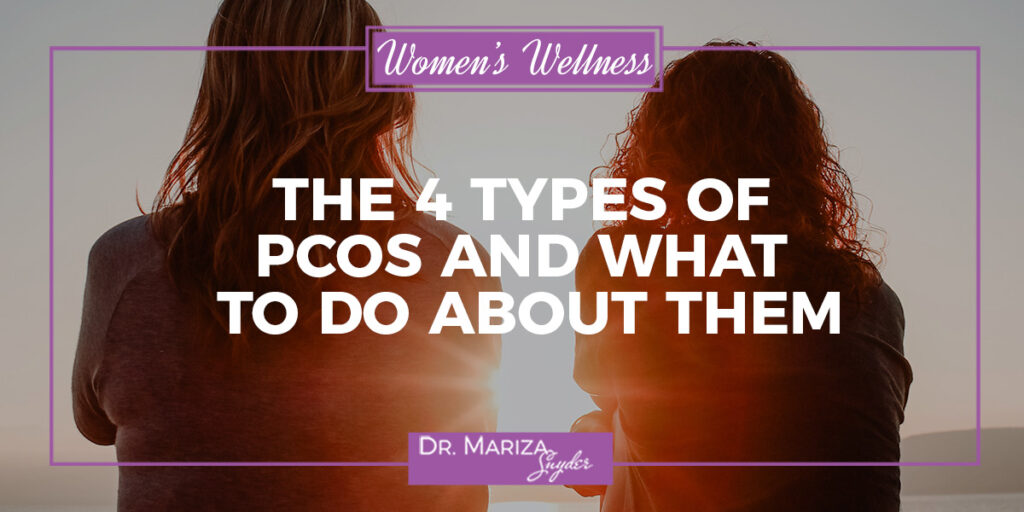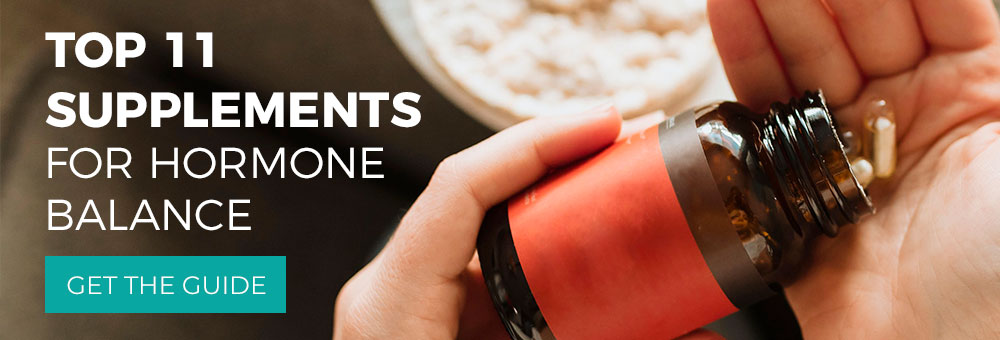
If you have PCOS, hormonal birth control is not the answer you need.
In fact, it could just be compounding your problem. It may mask and suppress your symptoms, but it is not actually healing you.
Are you feeling devastated, confused, and angry with the treatment you are receiving from your doctors? Are they just throwing pills at you and telling you that you will have to live with irregular cycles, acne, infertility, pain, and more of the symptoms that go along with a PCOS diagnosis?
There is another way.
We put a lot of power into our doctors’ hands. It’s truly up to you to put the pieces together and educate yourself on the best way to heal your body.
Today I want to shed some light on PCOS and the many options you have to truly heal your body. The only way to do this is by addressing the root cause of what is leading to your symptoms in the first place.
What Is PCOS Really?
Polycystic ovarian syndrome is a series of symptoms that stem ultimately from a failure to ovulate. It is one of the most common endocrine disorders among women, with an estimated 7 million sufferers in the US alone.
Ready for a sad fact? Up to 50% of those women may not even be aware they have PCOS. That’s how far our medical system is from treating women with the respect and dignity they deserve!
PCOS is present from puberty through post-menopause in some cases and affects women of every race and ethnicity. Beyond the typical uncomfortable symptoms (I’ll get to those in a minute), women with PCOS are at a higher risk of developing cardiovascular disease and diabetes.
PCOS Symptoms and Diagnosis
When your body doesn’t ovulate, you can’t produce progesterone. This causes an imbalance in your body that leads to a host of unsavory symptoms. The most common symptoms I hear women describe are:
- Acne
- Abnormal body hair growth
- Scalp hair thinning
- Weight gain
- Pelvic pain
- Infertility
- Anxiety
- Depression
- Irregular menstrual cycles
If you identify with these symptoms, it may warrant an investigation into the possibility of PCOS. But these can also be caused by other things, which leads many women to be misdiagnosed.
In order to have an accurate PCOS diagnosis, you need to have at least two of these things:
- 12 or more follicles are visible on one ovary or the increased size of your ovaries
- High levels of androgens (male hormones) in the blood, which leads to symptoms of excess body hair, scalp hair loss, and acne
- Menstrual dysfunction such as lack of period or irregular cycles
Despite what you may have heard, you can have PCOS even if you have regular periods. The key is whether or not your body ovulates because that is where the hormonal dysfunction occurs.
What you need to figure out is this: Why in YOUR unique case do you not ovulate? Symptoms and causes are very individual, so there’s no one-size-fits-all treatment. That’s why advocating for yourself and investigating root causes is so important!
But hear this: a PCOS diagnosis doesn’t mean your quality of life will decrease. It is possible to still conquer your symptoms and heal your body!
The 4 Types of PCOS
There are 4 main types of PCOS that all require different approaches for healing. But hear this: it IS possible to heal your body. You just need to do some digging to find what is really behind your symptoms and tackle it head-on instead of just suppressing the symptoms.
Here are the 4 root causes of PCOS and how you can narrow down which one is causing your symptoms:
#1 – INSULIN RESISTANT PCOS
This is the most common type of PCOS that I see. Insulin resistance is the root cause of so many hormone issues. Essentially, it means that your body keeps glucose (sugar) in the blood instead of delivering it to your cells to use it for energy. When your blood sugar stays elevated, your body does not ovulate and the high insulin levels trigger your ovaries to create testosterone instead of estrogen. Talk about a recipe for hormone chaos!
Things that can contribute to the development of insulin-resistant PCOS are smoking, consuming too much sugar or trans fats, and exposure to environmental toxins.
How to know if this is your root cause:
There are tests that can nail down insulin resistance, such as an elevated level of fasting insulin and HOMA-IR (homeostatic model assessment of insulin resistance). Push for these tests along with a glucose-insulin challenge test to get an accurate diagnosis!
Insulin resistance begins in the liver, so checking your liver function is key to zeroing into this as your root cause. Evaluating levels of triglycerides and GGT (gamma-glutamyl transferase) can indicate issues with your liver that could be behind your insulin resistance. Check out more recommendations here for reversing insulin resistance naturally!
#2 – PILL-INDUCED PCOS
The 2nd most common root cause of PCOS, this is one that breaks my heart. Many women are put on hormonal birth control at a young age to treat acne or some other surface-level symptom, but because the pill suppresses ovulation, it leads to PCOS.
Most women will resume ovulation after stopping the pill, but unfortunately, many women do not return to normal cycles. The pill only shuts down your cycle and masks symptoms while sending your body into hormone chaos, so I advise everyone to investigate other options before settling for hormonal birth control.
How to know if this is your root cause:
The tests you want to get a functional practitioner to review with you would be checking the ratio of luteinizing hormone to follicular stimulating hormone on day 3 of your cycle. If your cycle is irregular and you can’t pinpoint day 3, you can check for an elevated luteinizing hormone at any point. If it is elevated, it could be a sign that you are dealing with pill-induced PCOS.
#3 – INFLAMMATORY PCOS
Inflammation is the root cause of so many issues we face. It is behind many of the chronic and autoimmune diseases that are on the rise. In the case of PCOS, inflammation can cause hormone imbalance and prevent ovulation. Root causes of inflammation are highly individual, so it is important to investigate those to find your way to heal.
The good news with this root cause is that once you remove the inflammation drivers, your body should rebalance fairly easily!
How to know if this is your root cause:
Things to investigate would be hidden infections, toxic exposure, stress, inflammatory foods, thyroid disorders, vitamin D deficiency, and other inflammatory markers that can be detected in your blood.
Check out the most common root causes of inflammation and recommendations to heal your body here to start your journey to wellness.
#4 – HIDDEN PCOS
This root cause of PCOS may be tough to nail down, but once you do find it you can expect it to resolve fairly quickly (within 3 or 4 months). Hidden PCOS is caused by some other underlying exposure or disease that is affecting your body’s ability to ovulate. Here are some of the possibilities:
- Consuming too much processed soy (not in every case, but for some women its anti-estrogen properties could block ovulation)
- Thyroid disease, since the ovaries need T3 to function.
Not sure if it could be your thyroid? Your doctor may not be running all the tests you actually need. Check out the full panel I recommend here >>
- Iodine or zinc deficiency, which are more common in vegetarian and vegan diets
- Artificial sweeteners impairing insulin and leptin signaling. Artificial sweeteners are endocrine disruptors with no nutritional value — there is NO reason to have them in your diet!
- Too little starch. Your body needs healthy, complex carbs to manufacture hormones, so if you don’t eat any carbs or follow a keto diet, in some cases it can cause hormone disruption.
How to know if this is your root cause:
For these factors, self-reflection is the best test you can take! Examine your lifestyle and diet to see if any of these could be involved for you. These things can be simple switches that make a massive impact on how your reproductive system functions every single month!
How to Find Healing
When you receive a PCOS diagnosis, I know it can be scary. You may wonder if you’ll ever be able to get pregnant. You may feel trapped by your symptoms. But creating a happy balance in your life is possible.
By caring for yourself and advocating for the care you deserve, you can conquer this diagnosis.
A Go-to Guide for All-Around Hormone Support
As you can see, even though PCOS is a “reproductive dysfunction,” it is intricately connected with so many other systems in your body including your liver, insulin, blood sugar, thyroid, and so much more.
Optimizing your whole-body health and supporting your hormones with key nutrients is critical for your body to function at its best, especially if you suspect PCOS!
Get this free guide today for 11 simple supplements and herbs you can use to optimize your hormone health, without endless trips to the doctor’s office. These are safe, natural, and effective to help address your biggest symptoms!
FREE DOWNLOAD: Dr. Mariza’s Top 11 Supplements for Hormone Health
Ready to take charge of your own health?



No comments yet.